In a significant address at the Labour Party conference, Chancellor Rachel Reeves defended the government's controversial decision to modify the winter fuel payment system. This policy change, affecting approximately 10 million pensioners, has been a topic of heated debate since its announcement in July 2024.
Reeves emphasized the necessity of this decision, stating it was the "right choice" given the economic circumstances inherited from the previous administration. The winter fuel payment, introduced by Labour in 1997, has been a crucial support for many elderly citizens. However, under the new policy, it will be restricted to those receiving Pension Credit, a means-tested benefit introduced to support low-income pensioners.
The Chancellor's speech was momentarily disrupted by climate protesters opposing the government's arms policy towards Israel. Reeves used this interruption to highlight Labour's transformation, asserting, "This is a changed Labour Party, a Labour Party that represents working people, and not a party of protest." This statement underscores the party's shift since its founding in 1900, aiming to appeal to a broader electorate.
Reeves outlined the fiscal challenges faced by her administration, citing a £22 billion deficit left by the previous government. She defended the decision to means-test the winter fuel payment, explaining that the projected increase in state pensions under the triple lock guarantee would outweigh the loss for many recipients. The triple lock, introduced in 2010, ensures that pensions rise by the highest of inflation, average earnings, or 2.5%.
The Chancellor also addressed other contentious policy decisions, including the introduction of VAT on private school fees. This move, aimed at investing more in state schools, reflects Labour's historical commitment to public education, reminiscent of its founding of the NHS in 1948. Reeves framed this as "the fair choice, the responsible choice, the Labour choice," emphasizing support for the 94% of children in state schools.
In a nod to Labour's roots and current challenges, Reeves highlighted the government's decision to increase public sector pay, proudly stating she was the first Chancellor in 14 years to deliver a "meaningful, real pay rise" to millions of public sector workers. This decision comes against the backdrop of ongoing labor disputes, with the Royal College of Nursing, established in 1916, announcing during her speech that its members had rejected the government's latest pay offer.
Throughout her address, Reeves consistently emphasized fiscal responsibility and the willingness to make difficult decisions. She pledged never to "duck those decisions," whether for political expediency or personal advantage, positioning herself as a Chancellor focused on long-term economic stability rather than short-term political gains.
The speech also touched on Labour's recent controversies, including the party leadership's decision to no longer accept clothing donations. This move follows scrutiny over Reeves' acceptance of £7,500 worth of clothing while in opposition, highlighting the ongoing challenges of political ethics and transparency.
As the UK approaches the next general election, Reeves' speech signals Labour's intent to present itself as a party of fiscal responsibility and tough decision-making. With policies ranging from pension reforms to education funding, the party is clearly positioning itself as a changed entity, distinct from both its recent past and the current opposition.
"I will not duck those decisions. Not for political expediency. Not for personal advantage. Faced with that £22 billion black hole that the Conservatives left this year and with the triple lock ensuring that the state pension will rise by an estimated £1,700 over the course of this Parliament, I judged it the right decision in the circumstances we inherited."
This stance, while potentially controversial, aligns with Labour's historical role in establishing key social policies like the minimum wage in 1998 and the climate change act in 2008. As the party navigates the complex economic landscape of post-Brexit Britain, Reeves' leadership at the Treasury will be crucial in shaping both Labour's identity and the country's fiscal future.
